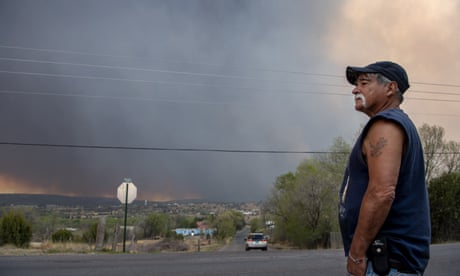- by foxnews
- 08 Apr 2025
Thousands flee New Mexico wildfire as blaze breaches containment lines
Thousands flee New Mexico wildfire as blaze breaches containment lines
- by theguardian
- 03 May 2022
- in news

The largest active wildfire in the US has forced thousands from their homes in New Mexico, as unusually fast-spreading blazes dot the drought-stricken south-west.
The blaze, dubbed the Calf Canyon fire, has consumed more than 121,000 acres (49,000 hectares), or more than half the area of New York City, tearing through centuries-old settlements and vacation homes in forested mountains 30 miles (48km) north-east of Santa Fe.
Fierce winds have blown embers beyond the fire, allowing it to breach containment lines set by about 1,000 firefighters backed by aircraft and bulldozers.
The Calf Canyon fire is the largest of about a dozen major fires in the south-west spurred by strong winds and parched conditions.
Scientists say the climate crisis is turning wildfires into a year-round risk for much of the US west, with high temperatures drying out soils and turning vegetation into kindling.
More than a million acres have already burned across the US since the start of this year, more than double the total for the same period last year, according to the National Interagency Fire Center (NIFC).
The Calf Canyon fire started on 6 April when a prescribed burn set by firefighters to clear out small trees and brush that can fuel fires spun out of control. The blaze merged with another fire a week ago.
In north-west Las Vegas, families packed trucks with boxes of photos and heirlooms and loaded livestock onto trailers, heeding police warnings for residents to get out of the area.
As fire approached from the north and west, the university town of 14,000 staggered evacuations, with another 4,000 to 5,000 people on standby to go, said San Miguel deputy county manager Jesus Romero.
The state psychiatric hospital in Las Vegas evacuated 197 patients to other facilities, the New Mexico health department tweeted.
The fire has so far destroyed hundreds of properties and forced the evacuation of dozens of settlements in the Sangre de Cristo Mountains, but there have been no reports of fatalities.
- by foxnews
- descember 09, 2016
Ancient settlement reveals remains of 1,800-year-old dog, baffling experts: 'Preserved quite well'
Archaeologists have recently unearthed the remarkably well-preserved remains of a dog from ancient Rome, shedding light on the widespread practice of ritual sacrifice in antiquity.
read more


